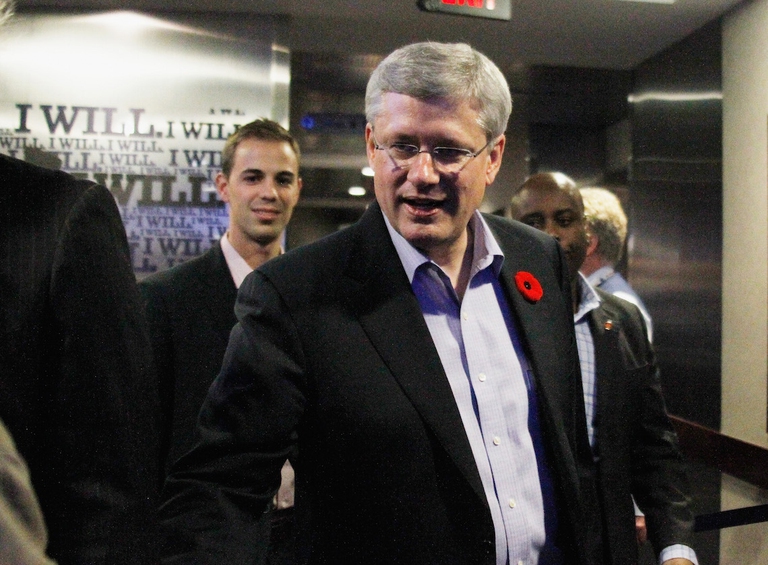
The Canadian province of British Columbia has banned grizzly bear hunting in all its forms. According to the Environment Minister, bears are worth more alive.
I conservatori canadesi, promotori di politiche giudicate catastrofiche per l’ambiente, potrebbero perdere il potere per la prima volta dal 2006.
After having governed for 10 years continuously, Canada’s conservatives led by Stephen Harper are likely to lose next federal elections, to be held on 19 October. Latest polls, just a few days to go before the election, indicate that the Liberal Party led by Justin Trudeau is now within reach of an electoral win, thanks to its local environmental and climate policies.
Over the past few years, in fact, Canada has shown poor attention to environmental issues: “At international level, Canada is currently isolated,” said Karel Mayrand, environmental expert at the David Suzuki Foundation, to the news agency AFP. “The country is missing the transition to sustainability. In a decade, we took many steps backwards. The government allowed the elimination of several regulations, such as that for the protection of rivers and lakes”. Stéphane Dion, former Liberal Minister for the Environment added that “The result is the international community now considering Canada to be like a cancer in the fight against climate change”.
Effectively, since they started governing in 2006, the conservatives led by Harper have made a series of decisions that turned out to be ecologically disastrous. In 2011, for instance, the country withdrew from the Kyoto Protocol, considering its goals to be non-realistic. Moreover, according to the French news agency, over time the country has eliminated numerous job positions of scientists committed to environmental issues. “Harper does not believe in explanations science provides on climate change, it therefore doesn’t feel the necessity to act,” said Thomas Mulcair, leader of the left-wing New Democratic Party.
Conservatives’ 3 mandates coincided with Canada’s great effort in exploiting oil deriving from oil sands, considered by environmental NGOs as the most polluting energy source. Extraction industry, mainly in the province of Alberta, is responsible for 73% of the increase in greenhouse gas emissions registered in the country over the past 25 years.
Since 1990, Canada has been increasing its emissions: according to Greenpeace, groups exploiting oils sands alone are going to generate emissions equal to a country with 10 million inhabitants, such as Belgium, by 2020.
Siamo anche su WhatsApp. Segui il canale ufficiale LifeGate per restare aggiornata, aggiornato sulle ultime notizie e sulle nostre attività.
![]()
Quest'opera è distribuita con Licenza Creative Commons Attribuzione - Non commerciale - Non opere derivate 4.0 Internazionale.
The Canadian province of British Columbia has banned grizzly bear hunting in all its forms. According to the Environment Minister, bears are worth more alive.
AXA, one of the world’s biggest financial services companies, is dumping investments in tar sands and ending insurance for controversial oil pipelines, taking fossil fuel divestment to new heights.
L’assemblea parlamentare europea ha approvato il trattato Ceta tra Unione europea e Canada. Ora la battaglia si sposta sul piano nazionale.
Per festeggiare il 150esimo anniversario del Paese il ministro dell’Ambiente ha annunciato che i 47 parchi del Canada saranno gratuiti per tutto l’anno.
Justin Trudeau responds to Donald Trump’s executive order to ban travel from seven majority Muslim countries and to put a halt on Syrian refugees coming to the U.S. In addition, the Canadian Immigration Minister Ahmed Hussan, who is a Somalian refugee also responds to the travel ban.
The United States and Canada have announced a permanent ban on oil and gas drilling in parts of the Arctic and the Atlantic.
Canadian Prime Minister Justin Trudeau has approved the building of a major oil pipeline known as the Kinder Morgan pipeline, which will run from the Alberta Tar Sands to the port of Burnaby on the province of British Columbia’s (BC) Pacific coast, whilst rejecting the construction of its twin, the Northern Gateway pipeline. The Kinder
In Canada un gruppo di monaci buddisti ha acquistato numerose aragoste destinate ad essere mangiate nei ristoranti e le ha liberate.
Prime Minister Justin Trudeau announced a new budget in March that pledges over 8 billion Canadian dollars for policies aimed at improving the lives of Aboriginal Canadians. This marks a significant increase in government funding focused on the country’s indigenous peoples, with the intent of reversing centuries of discrimination. Aboriginal Canadians Currently, the aboriginal community in









